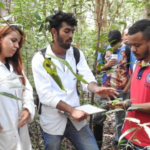
Authors
Sylvia Harrison, Jones Yengwe, Lukonde Mwelwa-Zgambo, Gideon Kasivu, Jonathan Muema Mwania, Joseph Kiggundu, Catherine Ngamau, Felix Obegi, Richard Loyolah, Satu Määttänen, & Eija Laitinen
The growing understanding of learning processes is calling for transformation from lecture-based to student-centered teaching methods. Lecture-based teaching concentrates on rote learning and homogenizes students. Student-centered methods, on the contrary, encourage active and critical thinking, and autonomy by shifting the responsibility from teachers to students, simultaneously developing skills such as communication, teamwork and problem-solving skills (Patel-Junankar, 2017). However, changing and adapting to new and different types of teaching may be difficult, especially if teachers lack opportunities for professional development (Misra, 2018).
For reforming the educational system and ensuring high-quality student learning outcomes, teachers should be provided opportunities to develop themselves professionally. In this article, we scrutinize challenges teachers face in their professional development and present how these can be overcome with adequate training. We take a special focus on training needs on problem-based learning (PBL). PBL uses real-world problems to motivate students to familiarize themselves with and apply research concepts and knowledge and work collaboratively (Duch et al., 2001). To be able to practice PBL as a teacher, pedagogical knowledge is needed.
Challenges on teachers’ professional development
The first step in overcoming challenges is to identify them. Based on the literature and our experience within six educational institutions in four countries, we identified the main challenges hindering teachers’ professional development.
Limited knowledge of opportunities. Teachers may not be aware of the professional development opportunities available within their working environment. Professional development is more than specific training programmes. It also includes peer classroom observation, coaching, discussions, networking and classroom-based action research.
Difficult working conditions. Insufficient renumeration, overcrowded classrooms, lack of materials, unsafe working environment and lack of respect are some of the reasons that demotivate teachers, subsequently decreasing their performance and willingness to develop.
Lack of support. The lack of teacher professionalism is often a reflection of the lack of professionalism in the education system. Hierarchical and rigid education systems demotivate teachers (Gemeda & Tynjälä, 2015). Worn-out teachers may resist attempts to enhance their professional abilities, especially when professional development does not result in improvements in classroom practices or career.
Lack of teacher identity. Many teachers become teachers, not by will, but by necessity, and may thus, lack professional identity or desire to strengthen that identity.
Lack of confidence. Teachers’ believing in themselves is positively correlated with teacher performance (Akyeampong, 2003). Teachers with low confidence—resulting from inadequate professional support—get frustrated. This in turn undermines teacher-student relationships, the quality of teaching, and the notion of teaching as a desirable profession. Teachers may not engage in professional development if they think nothing will change.
Poorly designed professional development. Professional development opportunities are often episodic, lack qualified facilitators and learning strategies, reflect budget constraints and face logistical challenges (Darling-Hammond, 2000). Not surprisingly, this causes teachers to perceive development programmes as low quality and irrelevant, demotivating participation.
Insufficient policies and budget for professional development. Thelack of robust policies and strategies leads to poorly organized training for teachers. This shows up as difficulties in timetabling, lack of harmonized schemes and insufficient budget (Darling-Hammond, 2000).
Professional development needs of teachers
To ensure quality teaching and learning, and incorporation of problem-based learning into teachers’ toolbox, teachers must receive adequate development opportunities. Below are some cardinal professional development needs and prerequisites.
Setting training standards and strategies. Institutionalizing standards and policies is the key to constant and up-to-date professional development. Setting up and governing standards for teachers, teaching methodology and quality, can be a game changer in the teaching and learning culture. Strategies should enhance educational coordination between different entities and enable fitting teacher training into staff calendars and university budgets.
Curriculum review. To adopt and implement the student-centered teaching approach, there is a need to transform from a traditional to a competence-based curriculum (Bergsmann et al., 2015). This process can improve professional development by improving communication and collaboration among the university community, decreasing teachers’ frustration.
Capacity building. A capacity building enhances teachers’ performance by building up their confidence and appreciation of their work. The transition towards PBL will require adequate sensitization to teachers and through them to students.
Opportunities for teacher collaboration. Collaborating with colleagues has been linked to increased teacher effectiveness and improved student performance (Kraft & Papay, 2014). Collaboration increases teachers’ willingness to adopt innovations (Granovetter & Soong, 1983). Building up a collaborative team spirit will improve the working environment and provide a platform for peer-support and sharing.
Digital competencies. Digital learning and teaching are necessities in today’s world. Teachers need constant support and opportunities to gain new competences in the digital era: how to use different digital tools, utilize learning with smartphones and social media, and how to accommodate the student-centered approach in these (Cochrane & Bateman, 2010; Gikas & Grant, 2013).
Training needs on problem-based learning
Inadequate professional development, and subsequently, lack of trained personnel are major factors hindering PBL adoption and implementation (Ibrahim & Al-Shahrani, 2018). The main training needs relating to PBL include:
Changing the mindset. In PBL teachers transform from directors to facilitators, which may make teachers feel less in control (Mansor et al., 2015). Thus, implementing PBL requires a mindset change. Just like any new teaching approach, the initial stages will be challenging. Teachers need training and peer-support to overcome the initial feelings of frustration and loss of control.
Identifying problem scenarios. Good problem scenarios are key to the success of PBL but coming up with problem scenarios can be challenging. Teachers initiating PBL require advice on how to formulate functional problem scenarios.
Managing PBL in large classes. Overcrowded classes are a reality in many educational institutions and implementing PBL within them may feel difficult. Thus, it’s important to provide training with practical tips on how to manage PBL in large classes.
Managing teams. To enable effective and vibrant student teamwork, the teacher must know how to strategically form and handle teams to prevent free-riding, personality clashes, blame and responsibility issues (Mansor et al., 2015). Training should also focus on how to assess teams and individuals within teams, and how to administrate peer-assessment and feedback systems (Michaelsen et al., 2014).
Time, workload and resource management. Teachers and students have complained PBL takes a lot of time, resulting in fewer topics being covered (Mansor et al., 2015). A lack of computers and other materials may also hinder PBL usage (Mansor et al., 2015).To become efficient PBL facilitators, teachers must learn how to plan and implement PBL with limited physical and time resources.
Conclusions
Lack of professional development opportunities and subsequently, inadequate knowledge of and skills to implement PBL are core factors leading to the low adoption rates of the method. Thus, teachers need to be given comprehensive training on pedagogical practices and PBL, as well as full support from the whole educational system. In this article, we have identified the main challenges related to teachers’ professional development and on implementing PBL and provided solutions and recommendations to overcome these challenges. We encourage training providers and the whole educational community to utilize these findings and provide quality professional development opportunities for teachers around the world.
This article has been written as part of a professional Problem-Based Learning Training Programme for East and Southern African university teachers. The training programme was organized as part of the AgriSCALE project (https://www.agriscale.net/) activities during 2021. AgriSCALE is an EU-funded project coordinated by Häme University of Applied Sciences (FIN), that aims to reform agricultural education and curricula in East and Southern African universities. Project partners include nine universities from East and Southern Africa and Europe.
Authors
Sylvia Harrison, MSc. in Animal Breeding and Quantitative Genetics. She works as a lecturer in the department of Animal Sciences at the University of Zambia.
Jones Yengwe, PhD in Applied Biological Sciences (Agricultural Sciences). He works as a lecturer in the department of Soil Science at the University of Zambia.
Lukonde Mwelwa-Zgambo holds a Master’s degree in Public Health (Nutrition) and is currently working as a lecturer in the Department of Food Science and Nutrition at the University of Zambia.
Gideon Kasivu, Ed.D in Educational Administration. He works as a senior lecturer and teaching planning coordinator in the department of Educational Administration and Planning at South Eastern Kenya University, Kenya.
Jonathan Muema Mwania, PhD in Educational Psychology. He works as an associate professor in the Department of Educational Psychology at South Eastern Kenya University, Kenya.
Joseph Kiggundu, PhD in Development studies. He works as a lecturer in the department of Development Studies, at the Gulu University, Uganda.
Catherine Ngamau, PhD in Plant Science. She works as a lecturer in the department of Horticulture and Food Security at the Jomo Kenyatta University of Agriculture and Technology, Kenya.
Felix Obegi, PhD in Business Information Systems. He works as a lecturer in the department of Accounting, Finance and Management Sciences at Egerton University, Kenya.
Richard Loyolah, BSc. in Development Studies and is currently conducting an MSc. degree in the same program in the department of Development Studies at the Gulu University, Uganda.
Satu Määttänen, M.Sc. in Agr. & For. and M.Sc. in Biol & Env. Sci. Research assistant in Häme University of Applied Sciences at Bio Research Unit, Finland
Eija Laitinen, PhD in Adult Education. Principal research scientist in HAMK Bio Research Unit, AgriSCALE and PBL-BioAfrica project coordinator and leader of the HAMK Africa Team in Finland.
References
Akyeampong, K. (2003). Teacher Training in Ghana -Does it Count? Multi-Site Teacher Education Research Project (MUSTER), Country Report One. https://doi.org/10.22004/ag.econ.12867
Bergsmann, E., Schultes, M. T., Winter, P., Schober, B., & Spiel, C. (2015). Evaluation of competence-based teaching in higher education: From theory to practice. Evaluation and Program Planning, 52, 1–9. https://doi.org/10.1016/j.evalprogplan.2015.03.001
Cochrane, T., & Bateman, R. (2010). Smartphones give you wings: Pedagogical affordances of mobile Web 2.0. Australasian Journal of Educational Technology, 26(1), 1–14. https://doi.org/10.14742/ajet.1098
Darling-Hammond, L. (2000). Solving the Dilemmas of Teacher Supply, Demand, and Standards: How We Can Ensure a Competent, Caring, and Qualified Teacher for Every Child (p. 44). National Commission on Teaching & America’s Future. https://eric.ed.gov/?id=ED463337
Duch, B., Groh, S. E., & Allen, Deborah, E. (2001). The Power of Problem-Based Learning: A Practical “How To” for Teaching Undergraduate Courses in Any Discipline (1st ed.). Stylus Publishing, LLC.
Gemeda, F. T., & Tynjälä, P. (2015). Exploring Teachers’ Motivation for Teaching and Professional Development in Ethiopia: Voices from the Field. Journal of Studies in Education, 5(2), 169–186. https://doi.org/10.5296/JSE.V5I2.7459
Gikas, J., & Grant, M. M. (2013). Mobile computing devices in higher education: Student perspectives on learning with cellphones, smartphones & social media. The Internet and Higher Education, 19, 18–26. https://doi.org/10.1016/j.iheduc.2013.06.002
Granovetter, M., & Soong, R. (1983). Threshold models of diffusion and collective behavior. The Journal of Mathematical Sociology, 9(3), 165–179. https://doi.org/10.1080/0022250X.1983.9989941
Ibrahim, M., & Al-Shahrani, A. (2018). Implementing of a problem-based learning strategy in a Saudi medical school: requisites and challenges. International Journal of Medical Education, 9, 83–85. https://doi.org/10.5116/ijme.5aae.2db8
Kraft, M. A., & Papay, J. P. (2014). Can Professional Environments in Schools Promote Teacher Development? Explaining Heterogeneity in Returns to Teaching Experience. Educational Evaluation and Policy Analysis, 36(4), 476–500. https://doi.org/10.3102/0162373713519496
Mansor, A. N., Abdullah, N. O., Wahab, J. A., Rasul, M. S., Nor, M. Y. M., Nor, N. M., & Raof, R. A. (2015). Managing problem-based learning: Challenges and solutions for educational practice. Asian Social Science, 11(4), 259–268. https://doi.org/10.5539/ass.v11n4p259
Michaelsen, L. K., Davidson, N., & Major, C. H. (2014). Team-Based Learning Practices and Principles in Comparison with Cooperative Learning and Problem-Based Learning. Journal on Excellence in College Teaching, 25(3–4), 57–84. https://eric.ed.gov/?id=EJ1041362
Misra, P. (2018). MOOCs for Teacher Professional Development: Reflections and Suggested Actions. Open Praxis, 10(1), 67–77. https://doi.org/10.5944/openpraxis.10.1.780
Patel-Junankar, D. (2017). Learner-Centered Pedagogy: Teaching and Learning in the 21st Century. In G. Kayingo & V. M. Hass (Eds.), The Health Professions Educator: A Practical Guide for New and Established Faculty (pp. 3–11). Springer Publishing Company. https://doi.org/10.1891/9780826177186





